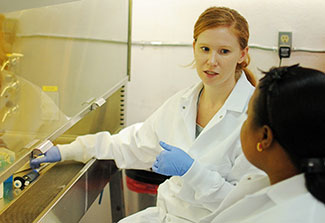
Fulbright-Fogarty Fellow Dr Brie Falkard studies cholera in children in Bangladesh
September / October 2016 | Volume 15, Number 5

Photo by Dr. Xinshu She/Boston Children’s Hospital
To help develop more effective cholera vaccines, Fulbright-
Fogarty Fellow Dr. Brie Falkard has studied the human
immune system response.
Fogarty Fellow Dr. Brie Falkard has studied the human
immune system response.
By Cathy Kristiansen
Dr. Brie Falkard was accustomed to handling study subjects that squeaked and scooted around cages, but she became drawn to a much more challenging research model than mice - humans. To venture into this new arena, she applied for a Fulbright-Fogarty Fellowship and set off to investigate how the human immune system reacted in cholera patients in Bangladesh.
“I thought it would be a lot more interesting to study immunology in a more direct environment,” said Falkard, who earned her doctoral degree in microbiology and immunology at Columbia University. “My background was microbiology in animal models, but with the fellowship, that completely switched. Now I’m focused on human immune responses.”
Her fellowship enabled the change and also gave her the opportunity to branch into global health research. Fulbright-Fogarty fellowships - supported through a partnership between Fogarty and the Department of State’s Office of Academic Exchange Programs - are designed to promote the expansion of research in public health and clinical research in resource-limited settings.
For her research project, Falkard focused on the hormone leptin, which mediates immune responses as well as metabolic processes, including appetite. First, she and her team measured the hormone in a small group of children - some with cholera and others without the disease - and followed them for 180 days. Leptin concentrations were lowest in acutely sick children. Researchers next studied 74 infected children and found that low leptin levels on the second day of illness were associated with improved immune responses to cholera, only in children with better nutritional status. “This study is the first assessment of leptin levels in individuals with cholera,” and indicates the hormone plays a role in the antibody response to the bacteria, Falkard and her colleagues wrote in a paper published in The American Journal of Tropical Medicine and Hygiene.
Falkard found many aspects of human studies more challenging than murine research, including limitations on which tissue can be sampled. “In mice, you can collect all sorts of body parts, whereas it’s very difficult to get a tissue biopsy of, for instance, the small intestine in humans.” She said it’s also important to obtain approval in human studies and ensure participants are comfortable with and engaged in the research. Researching in humans involved much more detailed planning, she added.
Falkard said her interest in global health sprouted during a short stint at a malaria center in Mali before her doctoral studies. “Everyone there comes down with malaria. It’s so shocking to see places in the world where you accept that you’re going to get extremely sick once a year,” she recalls. “It was a very intense experience. I wanted to go back to the field, after that.”
She chose Bangladesh for her fellowship because of the close collaboration between the International Centre for Diarrhoeal Disease Research in Dhaka - the capital - and Massachusetts General Hospital, where she was working. Her fellowship enabled her to learn more lab skills, such as flow cytometry and how to conduct a variety of immunological tests. “It was a really great space with a lot of robust research projects going on that you could help out whenever you wanted to learn.” She also developed as a mentor, training others in some lab techniques.
Falkard subsequently joined a cholera vaccine project in Haiti to work with colleagues she met during her fellowship. “I am really enjoying what I do, being able to conduct science and work in developing countries and on human disease,” she said. “The fellowship was useful for my career, and it completely changed what I do.”
More Information
- Learn more about the International Centre for Diarrhoeal Disease Research, Bangladesh (icddr,b).
- Learn more about Fulbright-Fogarty Fellows in Public Health.
To view Adobe PDF files, download current, free accessible plug-ins from Adobe's website.






















.png)











No hay comentarios:
Publicar un comentario